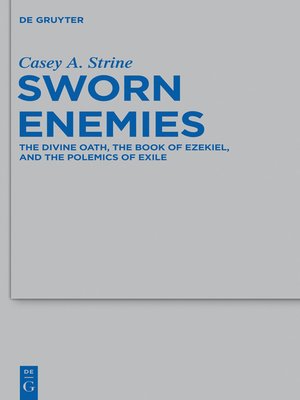Sworn Enemies
ebook ∣ The Divine Oath, the Book of Ezekiel, and the Polemics of Exile · Beihefte zur Zeitschrift für die alttestamentliche Wissenschaft
By C. A. Strine

Sign up to save your library
With an OverDrive account, you can save your favorite libraries for at-a-glance information about availability. Find out more about OverDrive accounts.
Find this title in Libby, the library reading app by OverDrive.



Search for a digital library with this title
Title found at these libraries:
| Library Name | Distance |
|---|---|
| Loading... |
Sworn Enemies explains how the book of Ezekiel uses formulaic language from the exodus origin tradition – especially YHWH's oath – to craft an identity for the Judahite exiles. This language openly refutes an autochthonous origin tradition preferred by the non-exiled Judahites while covertly challenging Babylonian claims that YHWH was no longer worthy of worship. After specifying the layers of meaning in the divine oath, the book shows how Ezekiel uses these connotations to construct an explicit, public transcript that denies and mocks the non-exiles' appeals to a combined Abraham and Jacob tradition (e.g. Ezek 35). Simultaneously, Ezekiel employs the oath's exodus connotations to support a disguised polemic that resists Babylonian claims that YHWH was powerless to help the exiles. When YHWH swears "as I live" the text goes on to implicitly replace Marduk with YHWH as the deity who controls nations and history (e.g. Ezek 17). Ezekiel, thus, shares the "monotheistic" concepts found in Deutero-Isaiah and elsewhere. Finally, using James C. Scott's concept of hidden transcripts, the author shows how both polemics cooperate to define a legitimate Judahite nationalism and faithful Yahwism that allows the exiles to resist these threatening "others".






